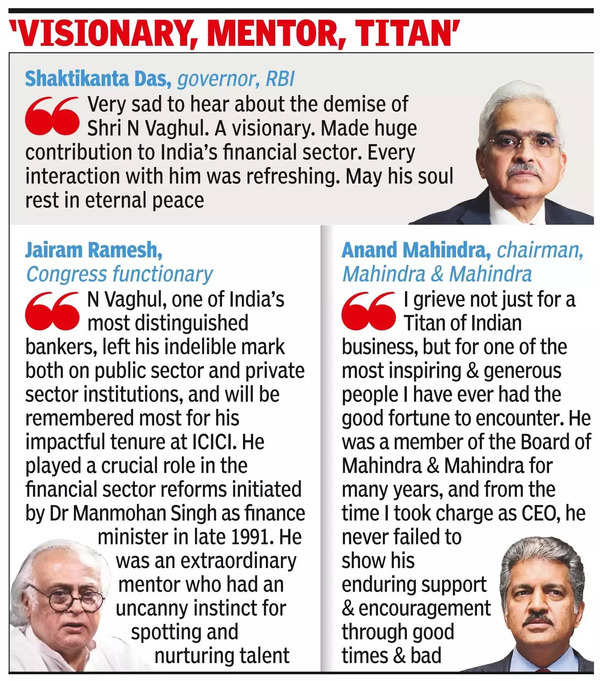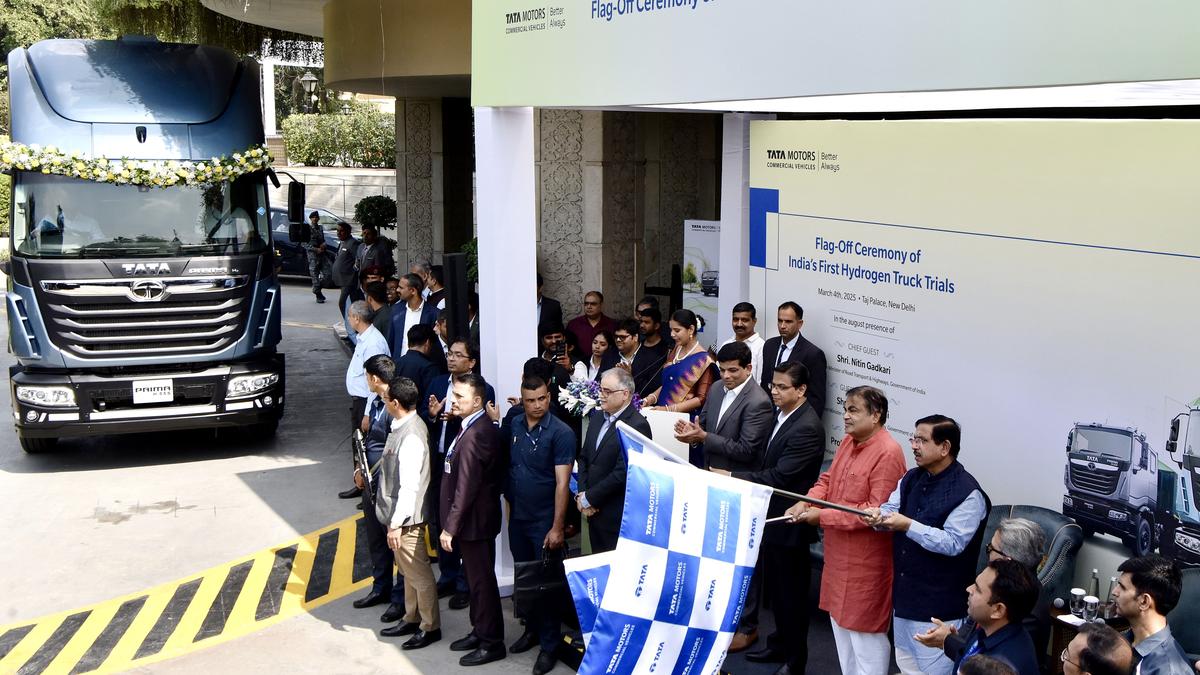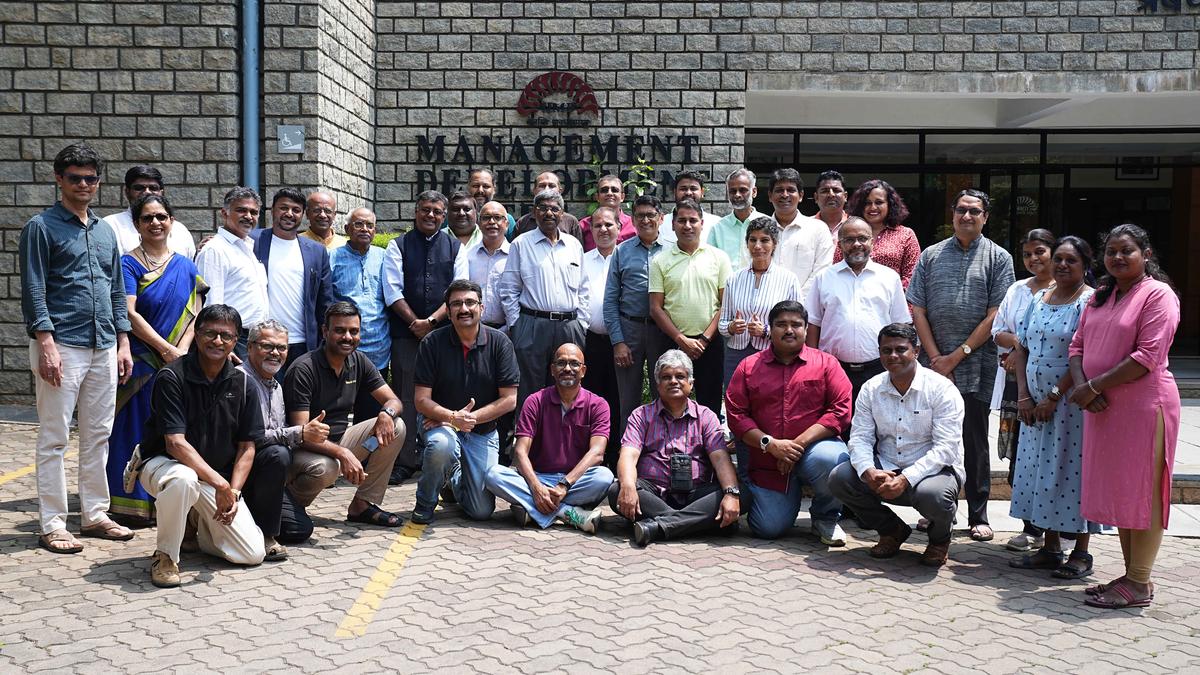Survived by his wife, son and daughter, Vaghul breathed his last in Apollo hospital in Chennai, where he was admitted after a fall.
Vaghul’s most storied achievement, one which ensured his place in Indian banking history, was building the ICICI brand in finance.ICICI is today India’s second biggest bank by m-cap, after HDFC. His five-decade-plus stint in the financial sector, which started when he cleared an exam for SBI probationary officer in 1957, was dotted with accomplishments.
Vaghul: The right man in the right job at the right time
A recipient of the Padma Bhushan in 2009, Vaghul was the youngest bank chairman, leading Bank of India at the age of 44. He was also the youngest chairman of the Indian Banks Association.
There was a point though when Vaghul left banking. He had risen up SBI’s ranks, mentored by another veteran banker, SBI chairman R K Talwar. But those were the heydays of Indian socialism. Bureaucrats thought they knew how banks should be run. Vaghul left banking, unwilling to follow bureaucratic diktats. Unusually for a man who dealt with money, he spent much of his break from finance studying spirituality at Swami Chinmayananda’s Ashram in Rishikesh. He also had a stint as director of the National Institute of Bank Management.
The job he took when he rejoined banking was the one that came to define him, and change Indian banking. In 1985, he took over the reins of what was then the Industrial Credit and Investment Corporation of India (ICICI).
ICICI was then a development finance institution, envisioned very much in pre-reforms mould. But India was already in churn. Vaghul’s term saw India getting hit by the balance of payments crisis, and out of that crisis the birth of economic reforms. He was the right man in the right job at the right time. He helmed ICICI through those tumultuous years, merged ICICI with ICICI Bank, having foreseen that the sharp rise in interest rates in the 1990s would hit development finance institutions.

To him goes the credit of building India’s first credit rating agency, Crisil. He set up ICICI Securities as an independent investment bank. Under him, ICICI was the first brave few which ventured into new age banking.
For most bankers, that would have been an achievement enough. But Vaghul was a pioneer in another, equally pathbreaking way. He broke the mould of stodgy recruitment practices that defined most of India Inc by, first, being a great talent spotter and, second, being a firm believer in a gender-neutral meritocracy. Vaghul’s ICICI recruited and mentored women financiers at a time the money game was almost exclusively male. And it was Vaghul who headhunted K V Kamath from Asian Development Bank. Kamath, who went on to become a banking great himself, took ICICI to the next level as a liberalised India opened up markets and opportunities. Not just Kamath, many of India’s financial sector leaders today – Sebi chief Madhabi Puri Buch, Multiples Asset founder Renuka Ramnath, Kalpana Morparia, who headed J P Morgan India for over a decade, Shikha Sharma, who led Axis Bank for nine years, and ICICI Bank chief Sandeep Bakhshi – were all spotted and mentored by Vaghul.
Per Kamath, Vaghul gave a free hand to him but was always there as a leader, a friend, philosopher and guide. “I have always looked up to Vaghul as my mentor,” said Kamath. “He brought this freshness of doing something different, something innovative and at scale, and drove its implementation. We quickly put in place a strategy function, thought of new business ideas, started recruitment at scale and built the foundation of this new ICICI,” Kamath recalled.
One of the many stories of Vaghul’s unique leadership style was about him empowering young executives at ICICI. He allowed anyone, however junior, to bring a credit proposal to the top bank committee as long as they could defend it before the panel. Even now, few company heads across sectors would be willing to bypass hierarchy like this. That’s what, those who worked with him say, made him an extraordinary leader.
Tributes poured in for Vaghul on Saturday. RBI governor Shaktikanta Das described him as “a visionary…(who) made huge contributions to India’s financial sector”. “Every interaction with him was refreshing,” he said.
Anand Mahindra, chairman, Mahindra & Mahindra, said Vaghul was a “titan of Indian business” and “one of the most inspiring and generous” persons he had ever met. Congress’ Jairam Ramesh, describing Vaghul as “one of India’s most distinguished bankers”, recalled his “wonderful sense of humour”.









![Best Weight Loss Supplements [2022-23] New Reports!](https://technologytangle.com/wp-content/uploads/2022/12/p1-1170962-1670840878.png)




